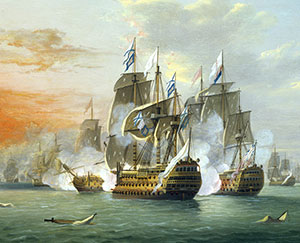April 12
Published in On this Day listing- 1782

Above: The Battle of the Saints—British Admiral George Rodney’s victory over a French fleet inspired Kerryman Eoghan Rua Ó Súilleabháin to compose ‘Rodney’s Glory’, to this day a mainstay of the traditional singer’s repertoire.
The Battle of the Saints, off Dominica. A British fleet under Admiral George Rodney routed a French fleet under the Comte de Grasse as it sailed to join the Spanish for an attack on British Jamaica. On board the Endeavour that day was Kerryman Eoghan Rua Ó Súilleabháin (‘Eoghan of the Sweet Mouth’), one of the last of the great Gaelic poets. Wandering for many years around Munster as a labourer and sometime schoolmaster, he was eventually engaged as a tutor by the Nagle family near Fermoy until he was discovered ‘misconducting himself’ with Mrs Nagle. Chased by her husband, he sought refuge in Fermoy barracks, where, he later insisted, he was press-ganged into His Majesty’s navy. In any event, with the battle won and in the hope of gaining a discharge, Eoghan Rua composed ‘Rodney’s Glory’, his famous eulogy to the martial glories of Great Britain and Admiral Rodney:
‘Come all you Britons stout and bold
Who scorns now to be controu’d
Good news unto you I will unfold
It is of brave Rodney’s glory’
—to this day a mainstay of the traditional singer’s repertoire. But if his verses delighted the bold Rodney they failed to elicit the desired discharge. Rodney was afterwards granted a peerage and an annual pension of £2,000, and died some ten years later in bed in his stately pile. No such luck for Eoghan Rua. Discharged some two years later, he returned to Kerry and opened a school, but died shortly afterwards at the age of 35 from fever after being struck by a pair of tongs in an alehouse fracas.
- 1820 Arthur Young, major English writer on agriculture best known as a social and political observer, author notably of Tour in Ireland (1780), died.
- 1960 The Broadcasting Authority Act established a nine-member RTÉ Authority to run both radio and television as a public service. RTÉ’s monopoly was abolished with the passing of the Radio and Television Act (1988), which allowed for the licensing of private commercial broadcasting.
- 1816 Sir Charles Gavin Duffy, journalist, Young Irelander, co-founder and first editor of The Nation (1842) and latterly premier of Victoria, Australia, born in Monaghan.
- 1923 The shadow of a gunman by Seán O’Casey opened in the Abbey Theatre.
















